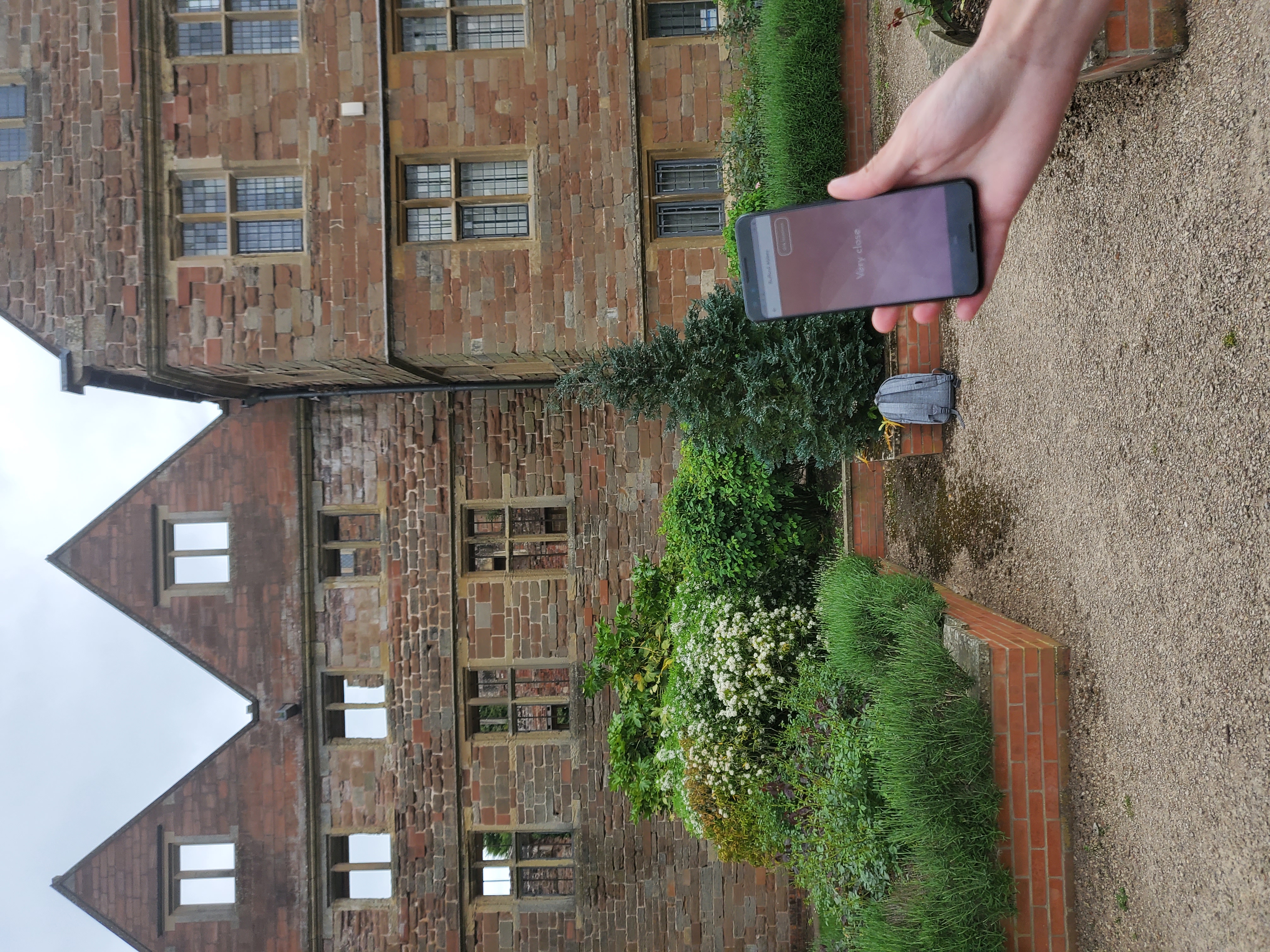Embedding AI and smart technologies in green spaces to enhance physical and mental health and wellbeing
A new project will seek to introduce cutting-edge AI and smart technologies to green spaces across the UK, helping to redefine how people engage with nature while enhancing visitors’ wellbeing.
By Dave Rogers | Published on 16 June 2025
Categories: Press office; Research; School of Science and Technology;

Nottingham Trent University has received almost £600,000 from the UKRI Engineering and Physical Sciences Research Council to lead the work, which will create inclusive, tech-augmented spaces that aim to improve physical and mental health.
The initiative is part of a wider ‘Engineering Healthier Environments’ project and will involve establishing a ‘GREEN+ Network’ to drive it forward and establish a roadmap for how new technologies can be integrated into public landscapes to promote healthier, more connected lives.
The project, in collaboration with the University of Edinburgh, will bring together academics, healthcare professionals, greenspace managers, technologists and community organisations.
It will involve investigating and incorporating nature-based interventions across environments such as parks, forests, zoos, adventure parks, botanic gardens and community green spaces.
Low cost and inclusive
The partners argue that a key aim will be to reimagine these green spaces not as static parks, but as interactive, intelligent ecosystems.
The team at NTU previously developed the ‘TagWithMe’ project, a smart wellbeing platform for green spaces which challenges visitors to identify tagged smart objects in different locations through a mobile app that delivered real-time challenges, quizzes and prompts.

TagWithMe
It is hoped that, in promoting physical and mental wellbeing, the work will help to support social prescribing and strengthen community connectedness.
Partners will co-lead pilot projects, workshops and other events exploring how pervasive technologies can help to support health and wellbeing in natural settings, and feasibility projects will be co-designed with potential users.
Ideas developed through the network will be low-cost, inclusive and designed to work within communities across the UK.
The team wants to harness the existing value of green spaces and the role of nature in lowering blood pressure, reducing anxiety and depression, improving cardiovascular health and enhancing creativity.
The aim is not to replace nature with technology, but to enhance the benefits people already gain from being outdoors by layering in subtle, supportive interventions.
“These are spaces people already trust, already love and are freely accessible – they are woven into daily life yet often overlooked as platforms for innovation,” said network director Eiman Kanjo, Professor in Tiny Machine Leaning and Pervasive Computing and Head of the Smart Sensing Lab in Nottingham Trent University’s School of Science and Technology.
Bridging the digital divide
The technologies developed will be broad and inclusive, benefitting older adults looking to stay active, young people engaged by gaming and exploring, people with mental or physical health conditions, and those in areas where access to healthcare or community resources is limited.
Experiences will range from imaginative and playful to clinically impactful and low-cost wearables and offline-friendly tools will help bridge the digital divide, ensuring no one is excluded for lack of devices or data plans.
Visitors could follow digital wellbeing trails, for instance, where AI-generated prompts encourage breathing exercises or gentle stretches, or smart sensors embedded in benches or pathways might offer live feedback on movement patterns and encouragement to keep walking.
Apps could suggest new areas to explore based on mood or health goals, using AI to personalise each visit.
Our work will harness AI systems, pervasive sensing and low-energy digital technologies, embedding them into our green spaces as a way to encourage movement and support physical and mental wellbeing,
Professor Eiman Kanjo
And in locations such as zoos or botanic gardens, families might engage with augmented storytelling experiences, where children unlock educational content about biodiversity by interacting with tagged objects or responding to challenges.
Meanwhile, people recovering from mental health challenges might find nature-based prompts supporting mindfulness, resilience and grounding techniques tailored to their condition.
“Our work will harness AI systems, pervasive sensing and low-energy digital technologies, embedding them into our green spaces as a way to encourage movement and support physical and mental wellbeing,” said Professor Kanjo.
“AI systems and smart infrastructure are reshaping how we engage with our surroundings. Through this bold interdisciplinary collaboration we hope to transform these spaces into responsive, data-informed hubs for healthier living.”
Enjoyable, empowering and evidence-based
It is considered important timing the project as the technological landscape has shifted dramatically – with the rise of energy-efficient microcomputing, edge AI and non-invasive biosensors – alongside an urgent health and societal need.
“Sedentary lifestyles continue to fuel a crisis in chronic disease and mental health concerns are at an all-time high,” added Professor Kanjo.
“Social fragmentation, exacerbated by the COVID-19 pandemic, has left many people isolated, disconnected from their communities and the natural world.
“This work helps to answer all of these challenges at once, inviting people back outside, back into movement, back into connection, through experiences that are enjoyable, empowering and evidence-based.
“It’s about finding new ways to move, breathe, play and connect – not by escaping into a screen, but by engaging more deeply with the world around us. It’s about seeing technology not as something separate from nature, but as something that, when designed with care and purpose, can help us rediscover it.”

Professor Eiman Kanjo
The team hopes that individuals will experience improved physical health through increased activity, reduced stress through mindfulness and engagement and a greater sense of purpose and connection.
And at the community level green spaces will become hubs for social interaction and public health outreach, reducing pressure of traditional service and fostering more resilient neighbourhoods.
For healthcare systems, meanwhile, the project offers new avenues for preventive care and data-driven support, and for policymakers, it is hoped to be a blueprint for how digital innovation can enhance public assets in equitable, sustainable ways.
Professor Kanjo added: “Importantly, the design process will be co-led by users themselves, with healthcare professionals, social prescribers and community groups shaping every stage of development.
“Through workshops, and funded pilot projects, we will continuously generate new ideas and partnerships, feeding back into a growing network of sites and stakeholders.”
Kia Nazarpour, Professor of Digital Health, School of Informatics, at The University of Edinburgh, said: “I am excited to join forces with Professor Kanjo to build the GREEN+ network community. The research at the intersection of health, care, and physical activity stands to benefit from this coordinated effort to address critical challenges in movement, rehabilitation, and mental health and wellbeing.
“Together, we can unlock equitable, scalable AI-enabled solutions to promote lifelong physical activity.”
Green space managers, industry innovators and healthcare professionals interested in being involved are invited to contact eiman.kanjo@ntu.ac.uk.
Notes for Editors
Press enquiries please contact Dave Rogers, Public Relations Manager, on telephone +44 (0)115 848 8782, or via email.
Nottingham Trent University (NTU) has been named UK ‘University of the Year’ five times in six years, (Times Higher Education Awards 2017, The Guardian University Awards 2019, The Times and Sunday Times 2018 and 2023, Whatuni Student Choice Awards 2023) and is consistently one of the top performing modern universities in the UK.
It is the 3rd best modern university in the UK (The Times and Sunday Times Good University Guide 2023). Students have voted NTU 1st in the UK for student employability (Uni Compare 2025)
NTU is the 5th largest UK institution by student numbers, with over 40,000 students and more than 4,400 staff located across six campuses. It has an international student population of almost 7,000 and an NTU community representing over 160 countries.
NTU owns two Queen’s Anniversary Prizes for outstanding achievements in research (2015, 2021). The first recognises NTU’s research on the safety and security of global citizens. The second was awarded for research in science, engineering, arts and humanities to investigate and restore cultural objects, buildings and heritage. The Research Excellence Framework (2021) classed 83% of NTU’s research activity as either world-leading or internationally excellent.
NTU was awarded GOLD in the national 2023 Teaching Excellence Framework (TEF) assessment, as it was in 2019.
NTU is a top 10 for sport (British Universities and Colleges Sport league table 2023).
NTU is the most environmentally sustainable university in the UK and second in the world (UI Green Metric University World Rankings, 2023).